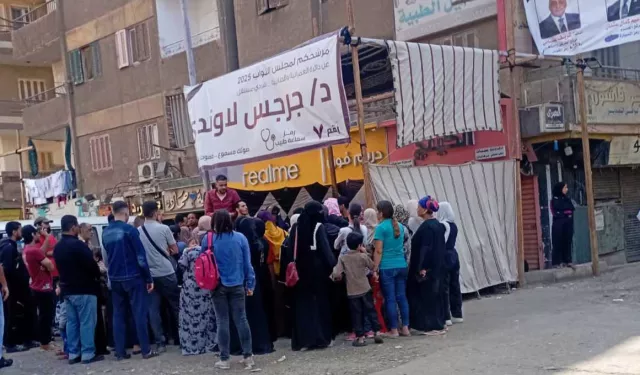Polling stations across Egypt stood mostly empty on the second day of parliamentary elections, mirroring the first: sparse turnout, staged voter lines, and repeated reports of violations, including continued vote buying.
In Boulaq Al-Dakrour in Giza governorate, the mobilization of voters continued into a second day. Tensions flared between supporters of two rival candidates, underscoring the manufactured intensity of the race.
By midday, turnout remained weak at key polling sites such as Sheikha Jawaher School, which houses 16 polling stations, as well as Taha Hussein Primary School and the local Azhar institute.
Tensions inside polling stations
Al Manassa documented microbuses and buses ferrying voters to Sheikha Gawaher School. The vehicles displayed banners for Nation’s Future Party candidates Hossam El-Mandouh and Mahmoud Toshka.
Nearby, dozens of supporters—including children—marched around polling centers in blue vests emblazoned with the Homeland Defenders party logo, chanting for their candidate, Araby Ziyada.
Altercations broke out inside Sheikha Gawaher between backers of El-Mandouh and Ziyada . A polling station head called police to remove people lacking observer credentials.
Another polling station head at the same school, which has over 10,000 registered voters, told Al Manassa that turnout had been low on the first day and that polls would stay open until the last voter cast a ballot.
Health workers from the government-backed “100 Million Healthy Lives” initiative were also present, offering free medical checks to voters.
Staged crowds and retained IDs in Dokki
Artificial lines continued outside polling stations in Dokki and Mohandeseen district. At the General Authority for Reconstruction and Agricultural Development, young men and women sat on plastic chairs. At the direction of a security officer in plainclothes, they were instructed to stand in lines as Culture Minister Ahmed Hanno arrived to cast his vote.
Several young people told Al Manassa they worked in nearby hotels and shops and had been brought in at 7 am. They said they could not leave because security officers or campaign organizers had collected their national ID cards.
One young man pleaded with a security officer to return his ID so he could make it to work by 5 pm.
At Badr Preparatory School for Boys on Iran Street in Dokk, Al Manassa observed 30 minutes pass without a single voter entering. Outside, young men loitered on benches, while campaign microbuses bearing images of National Front candidate Gen. Mohamed Kamal El-Daly and Nation’s Future candidate Ahmed El-Waleed idled nearby.
Vote buying and intimidation in Omraneya
In the Omraneya district, the scene repeated itself. Outside the Omraneya school complex, women told Al Manassa they received 200 Egyptian pounds (about $4) to vote for independent candidate Mohamed Ali Abdel Hamid, former deputy head of Parliament’s economic committee. Abdel Hamid is running independently after Nation’s Future opted not to field candidates in the district’s two individual seats.
Other voters were seen visiting the campaign headquarters of independent candidates Gergis Lawendy and Sayed Zaghloul to collect payments after casting ballots for them.
Charity-for-votes rumors in Imbaba
In Imbaba, similar scenes unfolded. Outside Ahmed Orabi School and Al-Monira School, groups of young people lingered without entering. One voter told Al Manassa that a woman heading a local charity had compiled a list of beneficiaries and instructed them to vote for a Nation’s Future candidate in exchange for 200 pounds. The claim could not be independently verified.
As with previous coverage, Al Manassa distinguished between two types of electoral districts: “closed” districts, dominated by government-aligned parties with predetermined winners, and a few “open” districts, where opposition and independents had limited space to compete. Coverage focused on the latter.
Calls for investigation
The Egyptian Social Democratic Party renewed its demand that the National Elections Authority intervene to halt what it called “blatant and serious violations” and take legal action against those involved.
In a statement reviewed by Al Manassa, the party said its monitoring unit documented vote buying, the distribution of campaign materials in and around polling sites, and the use of food boxes as bribes.
It also reported that some candidates and their representatives were barred from polling sites, undermining electoral fairness. In some locations, party operatives allegedly directed voters inside polling stations to choose government-aligned candidates, violating neutrality rules.
A follow-up statement cited further violations: food boxes and campaign flyers distributed at Al-Thawra and Al-Nasr schools in Assiut, voter steering and paid ballots in Giza’s Talbiya neighborhood, and campaigning within school precincts, including Ahmed Orabi, Umm Al-Mu’mineen, Al-Sadat, Hoda Shaarawi, and the Martyr Hesham Sheta schools.
Monitors were reportedly expelled from polling stations in Beni Suef’s Midoum Preparatory School and Luxor’s Keman Primary School, temporarily halting voting.
Runoffs for this phase are scheduled for Egyptians abroad on Dec. 1–2 and domestically on Dec. 3–4. The second phase begins Nov. 21–22 for citizens abroad and Nov. 24–25 at home, covering Cairo and 12 other governorates. Final runoffs are set for mid-December.
Egypt’s House of Representatives has 568 elected members—half by individual races, half by closed party lists—with up to 5% appointed by the president, for a total of 596 seats.
Final results are expected by late December.
